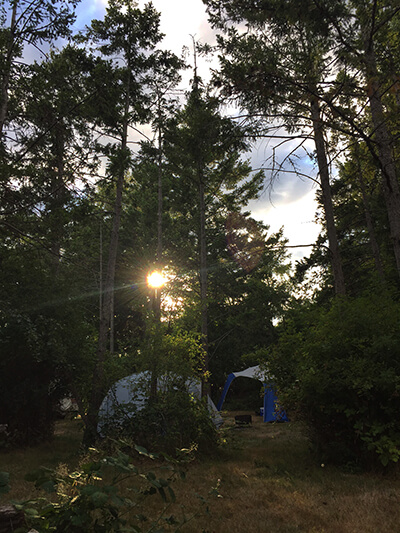With over 45 national parks and park reserves, as well as attendance levels of 13.5 million people in the last year, it’s safe to say that Canadians love the outdoors. But not all Canadians it seems.
Visitor surveysshow that new Canadians, from varied cultural backgrounds, are barely present in national parks. The numbers aren’t any better when it comes to the quintessential outdoor activity, camping.
“I just find the whole idea behind staying in a damp place, in a scrounged up way in a tent, very unappealing,” says 25-year-old Abeer Yusuf.
“Having the right gear and equipment are all things that require a fair amount of money in both Malaysia and India – so I wouldn’t assume that most people … pursue such interests just on the side.”
Yusuf is Indian by birth, but spent most of her life in Malaysia. Two years ago she relocated to study at the University of British Columbia, but has never been camping, even though the province she calls home has 830 provincial parks and 340 campgrounds.
“Having the right gear and equipment are all things that require a fair amount of money in both Malaysia and India – so I wouldn’t assume that most people that are from Malaysia and India pursue such interests just on the side,” Yusuf explains.
Tanya De Leon is also not a fan of camping, but she thinks it’s mostly the lack of running water and the hassle of packing. The 25-year-old was born in the Philippines and came to Canada when she was three years old. She has been camping a total of three or four times in all the years she’s lived in B.C. But unlike Yusuf, De Leon’s parents took her camping when she was younger.
“My parents didn’t enjoy it either, maybe that’s why I don’t enjoy it,” she says. “Camping isn’t something people do in the Philippines, that could have something to do with it.”
 Learning the basics of camping
Learning the basics of camping
A 2011 Ontario Parks campground survey found that people born in India made up less than one per cent of campers even though 2.6 per cent of Ontario residents were born there.
Similarly, people born in China and Hong Kong constituted more than three per cent of the province’s population, but less than one per cent of campground users.
This is an issue for Parks Canada, especially since visible minorities make up 20 per cent of Canada’s population and by 2030, one in three Canadian workers will have been born in another country. This is why Ontario Parks came up with the Learn to Camp program in 2011, which intended to teach first-time campers the basics.
But in B.C, where the population of visible minorities continues to increase, no such program exists. According to a BC Parks representative, the province lacks funding for this type of program and there are no future plans to create one, even though inexperienced campers like De Leon say that they would find it helpful.
The federal government does have a similar program that extends to B.C.
Through a partnership with the Mountain Equipment Co-op, Parks Canada offers learn-to camp events in every province except for Prince Edward Island, Yukon, Nunavut and the Northwest Territories. Events are only held in the summer from late June to mid-September.
But unlike Ontario’s program, the federal government’s equivalent is not aimed specifically at newcomers.
“You’ll be surprised, a lot of Canadians call us, not that many immigrants,” says Rachel Azzi, a Parks Canada representative. “Most of the people who call [were born in Canada] who have never been camping.”
A way to ‘integrate into Canadian culture’
According to a report published by Parks Canada, the number of visitors in Canada’s national parks and marine conservation areas increased from 12.5 million in 2010-2011 to 13.5 million in 2014-2015. But newcomers are still underrepresented in most surveys, so the question remains, why?
Paola Cernicchiaro, 30, says she thinks people aren’t comfortable with the risk involved.
“I think some people dislike discomfort, like going outside and not having a toilet, or being in nature and totally exposed,” she explains. “And some people like it, they like stepping out of their comfort zone to enjoy a beautiful sunset or do some exploring.”
Originally from Orizaba, Mexico, Cernicchiaro moved to Vancouver in 2007 and says she goes camping at least once a year. What she likes the most is spending quality time with the people she’s camping with.
“People don’t necessarily like camping in Mexico, but I go camping with my family every year during spring break,” she shares. “My grandma started that tradition, so my mom has been camping since she was a kid and I’ve been camping since I was a kid.”
“I think camping is important for immigrants who want to integrate into Canadian culture because it’s a great place to do it.”
Twenty-two-year-old Marguerite Royer also used to camp as a kid. Originally from France, Royer moved to Quebec when she was five. She has lived in B.C. for a year and a half.
She recently returned home from a camping trip on B.C.’s Hornby Island.
“I used to do a lot of camping as a kid because my parents loved outdoor activities,” she explains.
What Royer enjoys most about camping is building fires (something she was banned from doing this last trip because of the drought in B.C.), sleeping in the woods, outdoor activities and getting a break from technology. She dislikes when it rains and everything gets humid and cold.
“I think camping is important for immigrants who want to integrate into Canadian culture because it’s a great place to do it,” adds Royer. “It’s something great that we have here.”





